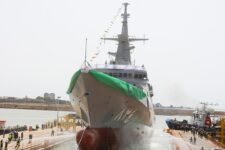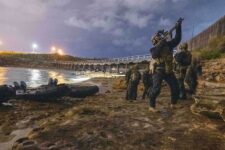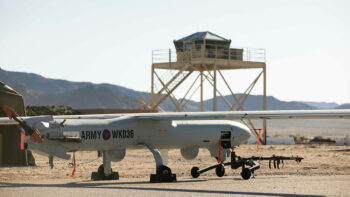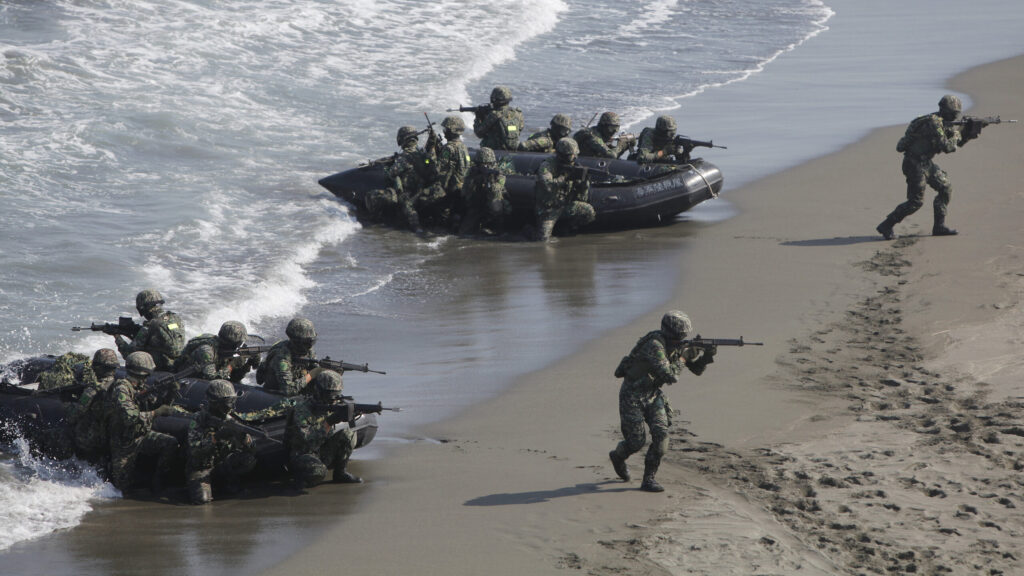
KAOHSIUNG, TAIWAN: ROC Marine Corps infantry units of 99th Regiment conducted an urban warfare drill in Kaohsiung’s Tsoying Naval Base on August 27, 2013 in Kaohsiung, Taiwan. (Photo by Ashley Pon/Getty Images)
SINGAPORE: Perhaps the most debated issue here at the Shangri La Dialogues is just how Russia’s illegal invasion of Ukraine will affect the Indo-Pacific region.
Exactly what is being discussed at all the bilateral meetings held behind the Singapore police and military guarding access to the labyrinth of checkpoints in this vast hotel is unknown, but strong hints abound from the public presentations and bits of chatter overheard in the lobby, at breakfast and lunch.
Will Taiwan be invaded, or will Russia’s experience in Ukraine heighten China’s wariness of an armed assault? What is China’s real relationship with Russia? Will AUKUS actually deliver a nuclear attack submarine to Australia in time for it to make a geostrategic difference? How will Japan’s plans to increase defense spending and to draw closer to NATO ripple across the region? What’s to be done about North Korea? How much will the US Coast Guard expand its operations in the Pacific and South China Sea?
But above everything else there is the fundamental discussion of how will the rising power of China and the still mighty but relatively fading power of the United States compete. Will there be cooperation on most issues? How much will force and the threat of force play roles in dictating each other’s behavior?
In an intriguing report by the International Institute of Strategic Studies (IISS), the conference’s organizers, the editors conclude that, as the above questions indicate, it’s really complicated and no one is sure exactly how the Indo-Pacific will manage the seismic shocks emanating from the shattered shell of Ukraine.
“Taiwan has become a particular focus of Sino-American tension. Fears that China may use military power to force the island’s reintegration have increased, and it seems likely that the United States would intervene to defend the island if that happened, even if Ukraine may have made an invasion less likely in the short-term,” the editors of this year’s edition of the Asia-Pacific Regional Security Assessment, say.
“International efforts on North Korea have failed to stop the Kim regime’s missile and nuclear weapons programmes, which have picked up pace and are causing renewed concern. Existing policies may need to be reconsidered,” write Tim Huxley and Lynn Kuok. “The United States has strengthened its security relations with its regional allies, particularly Japan and Australia. It needs to do this as it is unable, on its own, to carry the burden of balancing China across the region. But many regional states, including Japan, are keeping open the possibility of developing their economic relations with China.”
To make all this even more complex, they note, “Climate-change poses an additional threat to regional stability, and may worsen existing security problems while potentially creating new ones.” The Solomons Islands security pact with China certainly seems to bear that out, since many experts have said Australia’s mishandling of climate change policy with the Pacific islands was a key reason the island state was amenable to China’s approach.
On the wider geostrategic plane, China — despite gains it may be making in the Pacific islands — clearly feels threatened by the burgeoning (or tightening) network of alliances, partnerships and agreements between the US and many other countries in the region.
The Global Times, the semi-official English-language paper in China, published a story excoriating Japan for declaring it will “collude with NATO and to convince regional countries to serve its goal of targeting China, but in fact, the expansion of NATO is the root cause of the ongoing conflict in Ukraine, so if a NATO-like military organization emerges in Asia, the region would come much closer to a military crisis, said experts.” By this logic, of course, if NATO had remained smaller and no countries had been frightened by Russia’s actions enough to apply for NATO membership, then everything would have been fine. And China will not bully anyone, act illegally by seizing territory the UN says it is not entitled to or invade any country as long as there is no NATO-like group.
China has long declared its concern about any alliance it thinks might be designed to curb its power. Perhaps, like Vladimir Putin, the more China declares its concerns and acts as it does, the more likely it will be that such an alliance will come to pass.
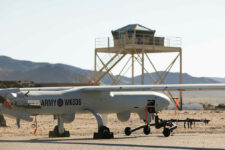







![RS179755_PMCS2620-FCAS-JPN-5A[1x1]](https://breakingdefense.com/wp-content/uploads/sites/3/2024/12/RS179755_PMCS2620-FCAS-JPN-5A1x1-e1734095138256-225x150.png)
